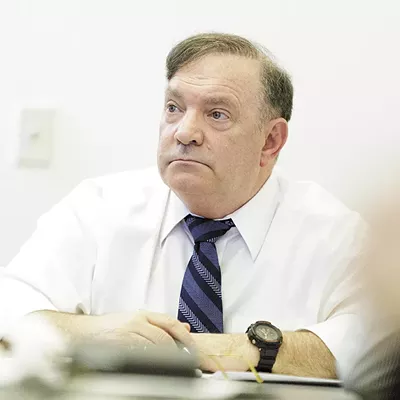In its Sunday, May 1, edition, the Spokesman-Review managed quite a feat: It published 2,000 words about River Park Square without once mentioning the name of Betsy Cowles. A visitor to the city who picked up the paper and read the story would not know that Betsy Cowles existed.
Yet the most important single fact about River Park Square was that it was not proposed by some Betsy Smith, but by Betsy Cowles -- who, if she aroused suspicions in some quarters, had instant credibility in many others. Betsy Cowles invented River Park Square, and the Cowles name gave her instant trust with the Spokane City Council.
She made every crucial decision on River Park Square. For example, in December 1999, a crisis arrived when all the miscalculations that would eventually make the deal crash were becoming clear to insiders. In a confidential memo, former city manager Terry Novak, a volunteer board member of the new parking garage, said: "We need to openly re-negotiate this set of contracts ... I hope I'm not being melodramatic when I say the 'total benefit of the community' is at stake."
The insiders who had put the deal together asked Betsy to rearrange the deal before it collapsed. Betsy said no.
Four years later, when councilmember Al French said he was agreeing to a settlement because "I feel I have a gun at my head," the person who held that metaphorical gun was Betsy Cowles. She was threatening to stop payments on the $23 million federal loan the city had arranged for her. That would take away the city's annual federal funds for its poor neighborhoods.
The Spokesman-Review article by Jim Camden skips over all these details and explains "the lessons of RPS" in terms of a political division in Spokane. Camden describes a tug-of-war between two groups, "progressives" and "populists."
This is true enough, and this political division certainly had a role in the making of the River Park Square fiasco. It was the knowledge on the City Council that they could not sell a public-private partnership (particularly with the Cowles group) that caused them to go underground with the plan.
But River Park Square was not about progressives and populists -- or communists or potato heads. The problem with River Park Square was the deal Betsy Cowles put together.
Camden admits there were problems in the deal -- for example, in the estimates of how much money would come into the new parking garage. But this miscalculation, he declares unequivocally, "doesn't fit into any grand conspiracy theory."
You see, "The project that Spokane got was not the same one" the experts on parking (the Walker firm) studied. The parameters changed. "The mall opened late. And only partially full. And with different parking rates that essentially gutted the money Walker said would come from theater patrons. So why wouldn't the revenues be different?"
Of course they would. But where did all those bad assumptions come from?
From Betsy Cowles.
She wanted the city to share the cost of building RPS, and that was fine with the 1997 city council. The problem was that the city could not just build a Nordstrom store -- that would violate laws against giving public money to private concerns, and besides would be hard to explain to Spokane's electorate.
So Betsy came up with this idea that the city would buy her garage for twice its market value. That windfall would generate an extra $10 million to $20 million to build a Nordstrom store.
But first there was another obstacle, which was that the city would have to justify the high price with an appraisal. It was Betsy Cowles' idea to go to the very usual method of "investment value appraisal" -- not what the building cost to build, but what it could earn some day.
Unfortunately, even using a speculative approach, fairly evaluated the parking garage would never earn enough to justify a $30 million price. So the developers and the city got creative.
Let's suppose, they said, that everyone parked in the garage -- even people who could find free parking on the streets on Sunday. Suppose that everyone parked for three hours (the national average in mall garages is two hours). Suppose theatergoers pay full price for parking while they watch a movie, even though that didn't happen in the real world. Suppose, also, Spokane merchants agree to pay millions to the garage in the form of "validation" programs. None of this was likely, and no one thought it was likely.
Yet Walker was handed all of these assumptions and told not to question them -- just count up the money that could theoretically be produced by these fanciful assumptions. The result was a full garage morning to night that justified a price tag of $30 million.
That's the conspiracy. The fundamental study that was supposed to justify the whole project was manufactured out of whole cloth.
Reading the Spokesman-Review to understand River Park Square is like having political dyslexia. You read and read, but no matter how hard you try, parts are mysteriously blotted out and you never quite grasp what really happened.
William Stimson is a journalism professor at EWU.
Publication date: 05/12/05

















